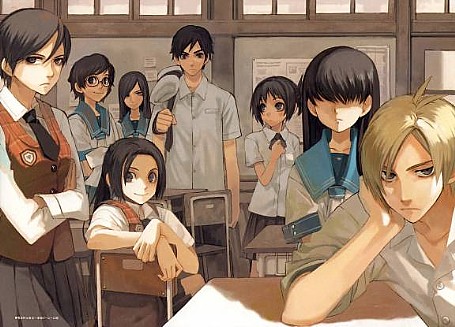
Episode 2 of the Denpa teki na Kanojo horror/psychological thriller OVA series recently came out. Episode 1 was pretty good, but I was particularly impressed with episode 2…
A theme that seems to resonate in both episodes of Denpa teki na Kanojo is not knowing people’s true nature – even the most normal, inconspicuous people, like Miya Satsuki from episode 1, can harbor twisted, insane feelings. Episode 2 continues this theme with a new antagonistic, and ultimately psychotic character, Kazuko Ayase. Like the previous episode, this episode introduced a few new characters, though the main focus continues to be learning the truth behind the disturbing mysteries in the story.
The happiness theme in episode 2 was quite unique and thought-provoking. The reasoning behind the Happiness Game offered some things to ponder: Can an ambiguous, intangible thing like happiness really be stolen from someone else? This sounds ludicrous to most people, who probably believe that happiness, like many things in life, is randomly and often unfairly distributed, or at least cannot be bought by deeds alone, as people can be unhappy even if they have many fortunes, and vice versa. My favorite author, Mark Twain, believes that happiness is part of a person’s natural temperament, and nothing can make a person who is naturally happy completely unhappy, nor a naturally unhappy person happy. Therefore, Ayase, a person so consumed by unhappiness, could never be truly happy no matter what she did (in her case, tormenting or killing people). But perhaps some desperate, suffering individuals would try anything to be happy. The thing that seemed to push Ayase to this was simply the unfairness of life – why was an innocent person like her doomed to so much tragedy while Shiraishi, the person who had caused the death of her brother, was showered with happiness?
The unpredictability of the episode, at least for me, was exciting too – I never saw the connection between the pranks and people’s happiness coming, nor did I think Ayase was the main instigator. I was also fooled by Shiraishi at the beginning of the episode. I never would have guessed that such a seemingly nice person had such a dark secret, and would do what she did in the end. Yet another example of the show’s theme of not knowing people’s true nature. The final scene where Shiraishi tries to murder Juu, though a bit abrupt, added a last dose of suspense. The revelation that the now demoralized Shiarishi actually subscribed to the beliefs of the Happiness Game, and would in turn attempt to kill Juu, only to be killed herself, literally came out of nowhere. But I’m glad the episode didn’t end without showing us the outcome of the accident and whether Juu survived or not.
In conclusion, although it glorifies the horrifying aspects a bit, Denpa teki na Kanojo provides good food for thought about the inner darkness and hidden, twisted ideals of emotionally and/or mentally disturbed human beings. I don’t think it’s impossible for people in reality to believe one can gain happiness by stealing it from another person. People forming a cult about such an idea and secretly executing cruel pranks for their cause is possible too. I think people should pursue happiness, but I draw the line when your happiness hurts others, especially those who are undeserving (I think there’s an old Aesop fable that goes like that XD) Although certain things in the show would be questionable in reality, for example the lack of police, parents, or other authority intervention, as a whole, Denpa teki na Kanojo definitely has meaningful things to say about the nature of human beings.
This animation’s story writer is Kentarō Katayama. It is one of the few stories where the girl is far more cooler then the guy–not in the average sexy way that most animators put it up as–but as a possible (uncool?) girl.